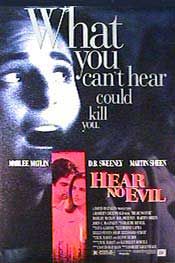
| None | Light | Moderate | Heavy | |
|---|---|---|---|---|
| Language | ||||
| Violence | ||||
| Sex | ||||
| Nudity |
Content:
(H, LL, M, N, RH, SS, VV) Humanism; over 25 obscenities & profanities; very little nudity except that it is shown in the context of a premarital relationship depicted as normal; police department shown to be corrupt (another police theft ring with the line cops depicted as virtual assassins & torturers for the Police Chief); violent murders as well as continual threatened harm to the hearing-impaired female lead; graphic depiction of a young woman being shot point blank repeatedly; and, director was seeking a young girl that had the look of “everybody’s daughter”–that image is particularly disturbing–intended & gratuitous.
More Detail:
In the movie HEAR NO EVIL, Jillian Shananhan (Marlee Matlin) is a deaf personal fitness trainer who is drawn unwittingly into a deadly police theft ring by one of her clients, Mickey O’Malley, an investigative reporter who uncovers the fact that the very vicious ring has just stolen the most valuable coin in the world. He gets the coin just before the actual robber gets murdered. Then his car blows up, but not before placing the coin in Jillian’s “pager.” Jillian doesn’t realize she has the coin but is aware that the corrupt police boss (Martin Sheen) believes she has it and is willing to kill for it. Enter Mickey’s friend, Ben Kendall, who sees it as his duty to protect her and to avenge his friend’s murder. The rest of the film turns on the woman’s deafness, being stalked by a killer, and placing her in improbable situations such as bathing in one room while a violent murder occurs in the next. Because of her deafness, she is unable to hear the screams.
HEAR NO EVIL’s plot exploits the character’s deafness. A sexual relationship develops between the deaf woman and her police protector; and, the cameraman spends too much time on the deaf woman’s face and her “wholesome” good looks. Information about the film clarifies that “It’s about relying on your strengths rather than allowing your weaknesses to defeat you.” Doing things in “your own strength” is the ideal herein, though crying out to God would have been more realistic and appropriate.
HEAR NO EVIL’s plot exploits the character’s deafness. A sexual relationship develops between the deaf woman and her police protector; and, the cameraman spends too much time on the deaf woman’s face and her “wholesome” good looks. Information about the film clarifies that “It’s about relying on your strengths rather than allowing your weaknesses to defeat you.” Doing things in “your own strength” is the ideal herein, though crying out to God would have been more realistic and appropriate.


 - Content:
- Content: 
